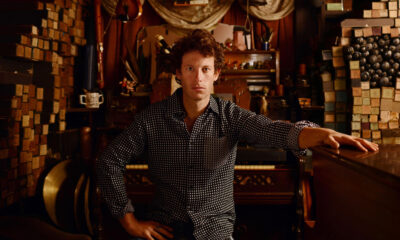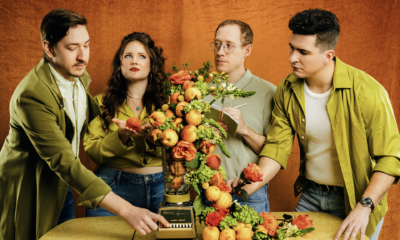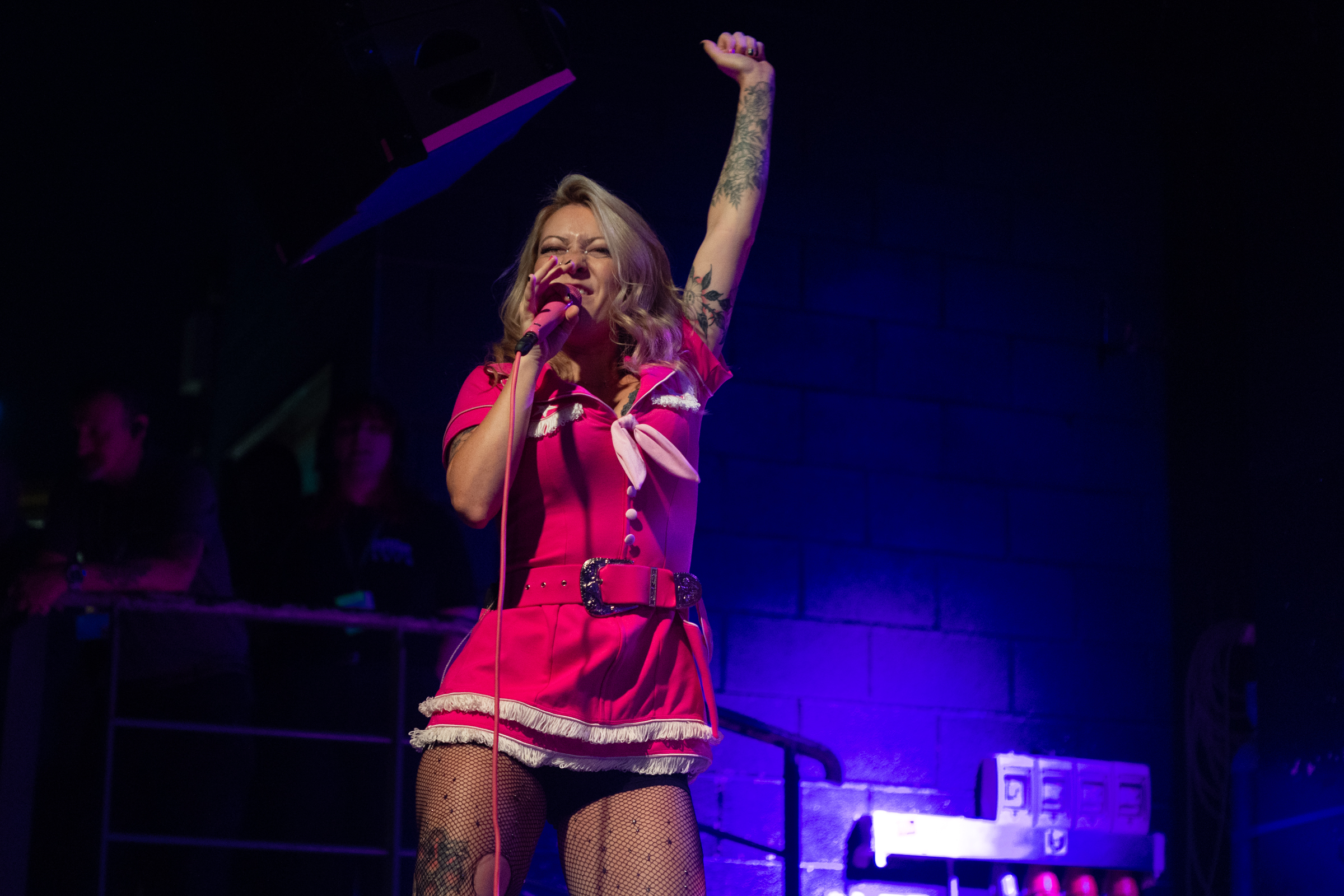Interviews
Chaos Rising Founder Stéphanie Nolf on Her All-Female International Collaborative Metal Project

This nightmare of a year has forced musicians to find new ways of working, but French vocalist/instrumentalist/songwriter Stéphanie Nolf was ahead of the pandemic when she founded Chaos Rising at the beginning of 2020. Her vision? An international collaborative metal project, uniting female musicians to make metal music together, showcasing their abilities and inspiring others.
The project is going from strength to strength, open to everyone while attracting some of the biggest names in metal. This week sees the release of their fifth video, “Thrive,” featuring Britta Görtz (Critical Mess, Hiraeus, Cripper), Mio of Frantic Amber, bassist Tina Grusch (Demorphed, Cryoblood), drummer Audrey Gardenat (Aesmah) and Stéphanie herself on guitar. We chatted with Stéph and other CR musicians about this very modern metal project.
Can you tell us a little about your musical background and your other group(s)?
Stéphanie Nolf: “I started playing music 28 years ago, learning to play bass alone, and from 1994-1998 I played in Endless Fall, a French hardcore-metal band. When that stopped, some ex-members and I created Unsafe, a thrash-death metal band in which I still play today. Then I learned to play guitar, to compose songs, to sing (to replace a singer who left us just before a studio recording), to program drums, to record albums, make video clips… everything that could keep Unsafe going despite the constant change of musicians. Our last album Mankind was released in 2019 and we are currently working on the next one. In January this year, I also joined Syrinx, a French metal/death/brutal hardcore band, as bassist.”
How did you have the idea for Chaos Rising?
“In 2016, when Unsafe was in a ‘standby’ period, I came across an ad on social media by an American female guitarist who was searching for musicians to make an all-female metal project. I had never played with women or even talked about metal with women before, so I thought – why not? We worked together for 2 years, online, to make an album in a metal style I had never tried before. And when it stopped, I wanted to go on with this experience and decided to do something more ‘open.’
At the beginning, we were only two French musicians, Isa (clean vocals & lyrics) and myself. Then more joined gradually from different countries (Germany, Switzerland, UK, Brazil, Iran, Sweden, France…) and now we are more than twenty. We are working in teams according to the different metal style musicians want to do, Thrash, Death, Melodic metal, Doom… There is a lot of flexibility which allows us to release something regularly. It’s an open collaborative metal project which belongs to every woman who proposes her contribution. My role is to gather ideas, make the song viable, fill in the missing roles (songwriting, guitar, bass, vocals, drums programming), mix songs, edit videos, and try to keep coherence, momentum and quality.”
How did you/do you find musicians to work with? For which aspects of the project is it most difficult to find collaborators?
“We posted ads on Facebook groups, and I contacted some musicians directly; others joined by word of mouth. The idea is for women to do everything. There are many female singers, guitarists, bassists – metal drummers are a bit more difficult to find – but the big problem is music production and this is perhaps where I have reached the limits of this project. We are still searching for women to mix and master metal albums! I have done it so far but it takes me a lot of time, it’s not my job, I am completely self-taught! We also search for women doing video editing and music promotion.”
What are the technical challenges of creating music in this way? What are the other challenges?
“The technical challenge is to succeed in having a good sound with people recording remotely. This is very difficult and I am actually kind of surprised by the quality of what members of the project succeed to produce and by their technical level – it is very good! The other challenge is the project development. I am working on many songs at the same time, five songs at the moment with different metal teams, it’s a lot to do! I must work on the project every day, on top of my day job. But as new musicians continue to join I will gradually have less to do – if someone wants to help manage the project, that would be cool!”
What is your favourite Chaos Rising song so far and why?
“Well, it’s not an easy question, I always prefer the next one as we progress with each song. Our new song is ‘Thrive’ – I like it because it’s the metal style I am the most at ease with, it’s intense and has a good technical level. I must thank Britta for her excellent ideas to modify the first composition I sent her and make it a killer song! 🙂 Some others are in preparation and are going to be excellent too, I am really happy with the songs composed by the other musicians. It’s very important to try to have a good technical level and do things to our very best abilities.”
Female metal musicians are becoming more accepted as equals – for example, it is no longer acceptable to describe a band as ‘female-fronted.’ But the fact is that most female metal musicians still tend to be vocalists. What do you think should be done to encourage more women to play metal instruments?
“Well, when I started music there were so few female metal musicians… things are changing now but not so fast! Maybe our project can add its contribution to encourage more women to play metal instruments. In France where I live, no one stops women from playing music in a metal band, we have the freedom to do what we want, so I wonder why there are still so few women invested in music… maybe being a female metal musician does not fit with society’s expectations.”
Have you ever suffered discrimination or negative attitudes/experiences from being a woman on the metal scene?
“I am happy to have had the opportunity to play with men in metal bands, as playing with women would have been impossible 25 years ago. In all the time I have been performing, going to many shows, festivals… I’ve never suffered discrimination or negative attitudes, other than a few jokes. Usually, it is positive comments from men concerning the fact that it is unusual. However I have seen on social media the problems that some women have suffered from male attitudes at shows and festivals, so I don’t say it does not exist, just that I did not experience it. For me, the best way to make things better is to play music, the more women invest in metal music, the less some men will have negative attitudes.”
This year even the word ‘woman’ has become a controversial term, with many people saying ‘woman’ is exclusionary. You have said from the beginning that this is not a project that is making a political statement in any way – it is simply women making music together. What would you say to people who argue that having a female-only project is exclusionary, or discriminatory?
“Some may say it is discriminatory to do an all-female music project, however, does anyone ask all-male bands if they are discriminatory? We are just women playing music together, I see no difference with the other bands I play in with men, just musicians who like to play metal music. It’s just cool to meet and talk with other female musicians with the same interest in metal.”
Where do you see the project going from here? An album? Live performance?
“I don’t know – let’s compose songs, play, mix ideas and experiences of many musicians from many different countries. We can do whatever we want, there are no limits, we’ll see! A live performance, that would be a lot of fun.”
https://youtu.be/q4lIP6IctAI
You started Chaos Rising before coronavirus hit, but the pandemic has meant that a lot of bands and musicians have had to work in the same way – i.e. remotely. So Chaos Rising has in fact exemplified the 2020 way of recording and releasing music. How do you see the music industry changing in the future?
“I started recording and releasing music online with other musicians from other countries four years before the pandemic. It was a good way for me to meet new people, progress and learn about composing music, try to play other metal, try to speak better English, have a more open mind. In terms of the music industry, over the past twenty years, I have seen the industry penalising musicians and artists more and more… I don’t imagine better in the future.”
Britta Görtz (vocalist, Critical Mess, Hiraes)
“I’m super excited to be a part of the Chaos Rising Project. It is my first collaboration of this kind – musicians from different bands working remotely together, spanning a wide range of metal genres. Stéphanie is a very versatile songwriter and producer, which makes the Chaos Rising Project with its various artists interesting for all kinds of metal tastes. Let’s all hope we can bring this baby to stage one day.”
Tina Grusch (bassist, Demorphed, Cryoblood)
“I’ve followed Steph and her band Unsafe for some time, and one lucky day she contacted me and asked if I’d like to be part of this metal project. Since I just loved the few already finished songs, I was so happy to say yes. The work process is wonderful, the internet gives us many opportunities to manage everything.”
Anika Ov Moseberg (vocalist, Virocracy)
“I learned about the Chaos Rising project after a friend from another band in my area, Tina, told me what they were currently working on and asked if I’d be interested in participating as a vocalist. They were planning to write a death metal style song for which I then contributed lyrics and vocals. Especially after the Covid outbreak, it was a great opportunity to keep actively making music and connecting to musicians all over the globe when shows and other events were cancelled. CR has already grown to be a ‘network’ of women who share their passion for heavy music and work hand in hand, but also learn from each other.
Anyone can contribute to songs of various genres with their skills. I am happy to be a part of it.”
-

 Music5 days ago
Music5 days agoTake That (w/ Olly Murs) Kick Off Four-Night Leeds Stint with Hit-Laden Spectacular [Photos]
-

 Alternative/Rock6 days ago
Alternative/Rock6 days agoThe V13 Fix #010 w/ High on Fire, NOFX, My Dying Bride and more
-

 Hardcore/Punk2 weeks ago
Hardcore/Punk2 weeks agoHastings Beat Punks Kid Kapichi Vent Their Frustrations at Leeds Beckett University [Photos]
-

 Alternative/Rock2 weeks ago
Alternative/Rock2 weeks agoA Rejuvenated Dream State are ‘Still Dreaming’ as They Bounce Into Manchester YES [Photos]
-

 Features5 days ago
Features5 days agoTour Diary: Gen & The Degenerates Party Their Way Across America
-

 Culture1 week ago
Culture1 week agoDan Carter & George Miller Chat Foodinati Live, Heavy Metal Charities and Pre-Gig Meals
-

 Music1 week ago
Music1 week agoReclusive Producer Stumbleine Premieres Beat-Driven New Single “Cinderhaze”
-

 Alternative/Rock1 week ago
Alternative/Rock1 week agoThree Lefts and a Right Premiere Their Guitar-Driven Single “Lovulator”














